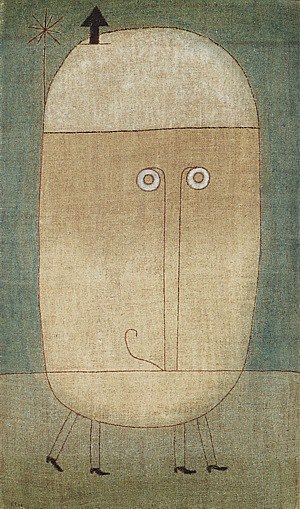A Few Plateaus

Paul Klee, Mask of Fear (1932)
History has always entailed the task of what Walter Benjamin describes as "wrestling conforming away from tradition." The religious question becomes which commandments still hold sway in the 21st century. Spinoza says that there is in fact only one commandment: respect thy neighbor as yourself. Therefore is it worth rejecting the Jewish theological and ethical tradition if Jews can have a nation state?
Phrased this way I think the answer is obviously not. There is first of course the semblance of safety that Israel offers, but does "never again" only mean "never again for some?" It is worth mentioning that in once sense these events are monads in nature, the similarities between inquisition, pogrom, genocide, ethnic cleansing and holocaust only seek to underline not their similarities, but their intense differentiation. Different forms of violence resulting from different historical circumstances. Adam Tooze finds it more productive to “situate the Middle Eastern conflict in its historical context.”
“Never again” is a given from a mathematical standpoint and only holds weight in reference to some hypothetical future event that will be similar, but different. Thus we could describe a hauntology, in which a nonexistent threat, or even a threat in the past tense is the historical justification of the creation of a state of Israel. Compare difference in US and German attitudes. There is a specter haunting Europe, the specter of the holocaust. Some of the claims made about anti-semtism are simply absurd, there is currently no genocide against the Jewish people, but there is one in Gaza and there is ethnic cleansing in the West Bank. Violence is functioning very differently in both of these last two locations. In Gaza it is the expression of the most extreme form of state violence stemming not just from Israel, but from the support of the US as well. In the West Bank the violence appears more molecular and suggests the awareness of the presence of non-state actors willing to carry out the same or similar objectives being pursued in Gaza.
These events deserve their own unique attention. Comparison is of course productive, but only from the perspective of differentiation. Masha Gessen is most apt in this line of thinking.
Compare this to Deleuze and Guattari: “Abstract machines operate within concrete assemblages: they are defined by the fourth aspect of assemblages, in other words, the cutting edges of decoding and deterritorialization. They draw these cutting edges. They draw these cutting edges. Therefore they make the territorial assemblage open onto something else, assemblages of another type, the molecular, the cosmic; they constitute becoming.” In other words, a few separate plateaus, which operate on a single plane.


very kool
ReplyDelete